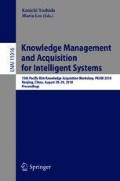Abstract
Planning domain models are critical input to current automated planners. These models provide description of planning operators that formalize how an agent can change the state of the world. It is not easy to obtain accurate description of planning operators, namely to ensure that all preconditions and effects are properly specified. Therefore automated techniques to learn them are important for domain modelling.
In this paper, we propose a novel method for learning planning operators (action schemata) from example plans. This method, called LOUGA (Learning Operators Using Genetic Algorithms), uses a genetic algorithm to learn action effects and an ad-hoc algorithm to learn action preconditions. We show experimentally that LOUGA is more accurate and faster than the ARMS system, currently the only technique for solving the same type of problem.
Access this chapter
Tax calculation will be finalised at checkout
Purchases are for personal use only
Notes
- 1.
As ‘complex’ models we consider models that have a large number of predicate types and operators. Such models usually have long genomes so the genetic algorithm has to search through a large hypothesis space.
References
Cresswell, S., Gregory, P.: Generalised domain model acquisition from action traces. In: Proceedings of the 21st International Conference on Automated Planning and Scheduling, ICAPS 2011, Freiburg, Germany, 11–16 June 2011 (2011)
Cresswell, S., McCluskey, T.L., West, M.M.: Acquisition of object-centred domain models from planning examples. In: Proceedings of the 19th International Conference on Automated Planning and Scheduling, ICAPS 2009, Thessaloniki, Greece, 19–23 September 2009
Gil, Y.: Learning by experimentation: incremental refinement of incomplete planning domains. In: Proceedings of the Eleventh International Conference on Machine Learning (ICML 1994), pp. 87–95 (1994)
Gregory, P., Lindsay, A., Porteous, J.: Domain model acquisition with missing information and noisy data. In: Proceedings of the Workshop on Knowledge Engineering for Planning and Scheduling, ICAPS 2017, pp. 69–77 (2017)
Jilani, R., Crampton, A., Kitchin, D.E., Vallati, M.: Ascol: A tool for improving automatic planning domain model acquisition. In: Proceedings of AI*IA 2015, Advances in Artificial Intelligence - XIVth International Conference of the Italian Association for Artificial Intelligence, Ferrara, Italy, 23–25 September 2015, pp. 438–451 (2015)
McCluskey, T.L., Cresswell, S.N., Richardson, N.E., West, M.M.: Action knowledge acquisition with Opmaker2. In: Filipe, J., Fred, A., Sharp, B. (eds.) ICAART 2009. CCIS, vol. 67, pp. 137–150. Springer, Heidelberg (2010). https://doi.org/10.1007/978-3-642-11819-7_11
McDermott, D., et al.: PDDL - the planning domain definition language. CVC TR-98-003/DCS TR-1165, Yale Center for Computational Vision and Control (1998)
Mitchell, M.: An Introduction to Genetic Algorithms. MIT Press, Cambridge (1998)
Shahaf, D., Chang, A., Amir, E.: Learning partially observable action models: efficient algorithms. In: Proceedings of Twenty-First AAAI Conference on Artificial Intelligence, pp. 920–926 (2006)
Wang, X.: Learning by observation and practice: an incremental approach for planning operator acquisition. In: Proceedings of the Twelfth International Conference on Machine Learning (ICML 1995), pp. 549–557 (1995)
Yang, Q., Wu, K., Jiang, Y.: Learning action models from plan examples using weighted MAX-SAT. Artif. Intell. 171(2–3), 107–143 (2007)
Zhuo, H.H., Kambhampati, S.: Action-model acquisition from noisy plan traces. In: IJCAI 2013, Proceedings of the 23rd International Joint Conference on Artificial Intelligence, Beijing, China, 3–9 August 2013, pp. 2444–2450 (2013)
Zhuo, H.H., Yang, Q., Hu, D.H., Li, L.: Learning complex action models with quantifiers and logical implications. Artif. Intell. 174(18), 1540–1569 (2010)
Acknowledgements
Research is supported by the Czech Science Foundation under the project P103-18-07252S.
Author information
Authors and Affiliations
Corresponding author
Editor information
Editors and Affiliations
Rights and permissions
Copyright information
© 2018 Springer Nature Switzerland AG
About this paper
Cite this paper
Kučera, J., Barták, R. (2018). LOUGA: Learning Planning Operators Using Genetic Algorithms. In: Yoshida, K., Lee, M. (eds) Knowledge Management and Acquisition for Intelligent Systems. PKAW 2018. Lecture Notes in Computer Science(), vol 11016. Springer, Cham. https://doi.org/10.1007/978-3-319-97289-3_10
Download citation
DOI: https://doi.org/10.1007/978-3-319-97289-3_10
Published:
Publisher Name: Springer, Cham
Print ISBN: 978-3-319-97288-6
Online ISBN: 978-3-319-97289-3
eBook Packages: Computer ScienceComputer Science (R0)

